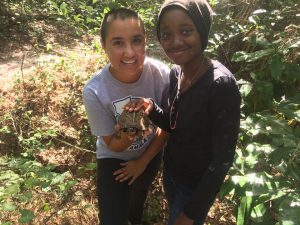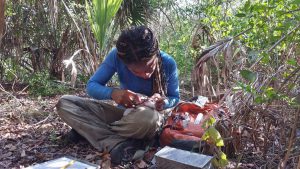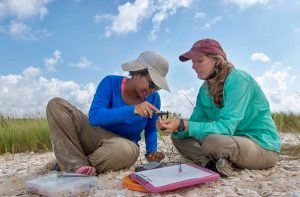By Rhett Barker

Each spring, UF sends four undergraduate students to the national Doris Duke Conservation Scholars Program (DDCSP). DDCSP is a two-year research and mentorship program, fostering a generation of conservation professionals with diverse backgrounds, as well as excellent research and leadership skills. Five other universities send students to this program, and all meet and learn from each other, as well as from graduate students and faculty mentors.
We spoke with many of the UF DDCSP scholars and their faculty and graduate mentors to learn more.
The first common experience shared by all DDSP scholars is a weeklong trip to the National Conservation Training Center in West Virginia.
Scholars learn about leadership, diversity, and ecology. They also meet a range of conservation-related professionals and learn about career opportunities in the field.
“People from the federal government talked to us about opportunities there, and how to apply for a federal position if we were interested. That was useful!” says WEC sophomore Joelle Carbonell-Bierbaum.
“A lot of the speakers were from different backgrounds professionally,” says Political Science and Sustainability junior Marcela Mulholland. “There was a documentary filmmaker….He works on increasing representation in conservation movies. Also, different policy-oriented people. It made me realize there are a lot of different ways to contribute.”
Scholars also learned wildlife field techniques from UF faculty mentor Dr. Christina Romagosa, including camera and small mammal trapping, water and invertebrate sampling, mist netting and GIS.
“I really enjoy introducing them to the field experiences that excite me,” she says, “I’m out there catching turtles and frogs with them, and then taking them on a bird walk.”
“Hearing them say, “Oh, I never realized that people could do work just on birds, or just on frogs. Seeing that light go off, when they realize all the things they can do, when they haven’t really been exposed to it before, is really great! I’ve really enjoyed that part. Watching them develop professionally, and then watching them develop their own biological interests has been really fun!”
Scholars work in the field with grad student mentors for their first summer in the program.

WEC junior Amy Almond worked with her mentor, Mike Knorr from Clemson University, on his project studying the critically endangered bog turtle (Glyptemys muhlenbergii).
During her time on the project, Amy had the privilege of being one of only forty or so people who have ever seen a nesting bog turtle.
“We had to go out at night, because they start nesting at dusk, around when it gets really dark. We did nest checks almost every night, so we would go out walking along a rivulet, and see a bog turtle nesting there. We’d stop and back away!”
Other scholars worked with UF graduate students Wes Boone and Nichole Bishop on Sanibel Island and at Marineland in St. Augustine, Florida. They all completed independent projects, the results of which they presented at the Ecological Society of America (ESA) conference. Several papers written by students and based on their projects are also in peer review.
For her project, Joelle used data she helped collect, along with several previous years’ data, to check for competition between two small mammal populations on Sanibel Island.
When asked if she found anything interesting, she laughed and replied,
“No! There’s no competition. That can be good though! We found out the two species are not competing!”
During their second summers, the DDCSP mentors help students to apply for internships tailored to their interests, ranging from herpetological fieldwork to environmental justice, and based in locations from Idaho to Africa. Many of the students I spoke with considered these internships their first real taste of the world as a wildlife professional, and credited the DDCSP program and their mentors with helping them succeed. Hanna Innocent, who is working in Swaziland this summer, said,
“It’s really cool, and I never thought it would happen. I’ve always wanted to go to Africa since I was little, that’s kind of what sparked my whole interest in this path. I think I got it because of Doris Duke, because I had the experience and I had the references. It’s also because I participate a lot in class, but I feel like Doris Duke really helped broaden my career/journey/future.”
The mentors for this program are passionate and dedicated to its mission.
Dr. Romagosa had this to say:
“Being a minority myself, and going through the conservation and ecology field, those sorts of programs didn’t exist when I was in undergrad, and so having something that takes students from different backgrounds that have absolutely no field experience, no outdoor experience, and giving them the skills they need: if that had existed when I was in undergrad it would have been fabulous.”
Dr. Ray Carthy, who has been with the program since its inception, said he has “been extremely gratified by some of the outcomes we’ve had in terms of the engagement of the scholars, the engagement of the grad student mentors, and where the program has taken them and continues to take them in terms of their careers, their interests, and what they do when they leave the program.”

Grad student mentor Nichole Bishop found her work for the program personally formative.
“My first year I had five students by myself, which was like, “Oh my gosh what am I doing?”
Each student had their own individual project, and we had the main project we were all working on together, and trying to keep everybody busy, and assigning roles, and figuring out who’s better for which role, and trying to keep them encouraged, and trying not to discourage them, and dealing with all the physical problems of being hot, and raining, and in the middle of nowhere.
So I learned a lot about management, which I find very useful. I want to continue in academia. I want to become a teacher, and stay in academia, and have my own research program, so I call this a “practice faculty position”.”
Every scholar I spoke with credited the program with immense personal and professional growth.
“I think it’s opened my eyes to how many career options there are in the conservation field… It definitely has pushed me to continue pursuing environmentally-related career fields,” said Mullholland.
“I’m really grateful for the Doris Duke Scholars Program,” Modeline Celestin said, “because, besides school, and making me much more concrete and confident in what I wanted to pursue, it allowed me to be much more confident in myself, in terms of expressing my uniqueness and individuality.
Part of Doris Duke is not only wildlife conservation and ecology, it’s also about diversity and inclusiveness.
Meeting other students from across the country who are also part of the Doris Duke program is really eye opening. It’s encouraging because it lets me know I’m not the only one out there in this field of study who happens to be a person of color, because it can be hard to see that at UF with the classes I’m taking. Not that it bothers me, but it’s nice to see someone else with my same background who’s pursuing this.
There’s comfort in knowing that, and so with the Doris Duke Program and the Initiative for Diversity and Inclusiveness it’s just heartwarming to know we are making a movement out there, regardless of how small it may seem. There is a movement happening towards it and that’s comforting to know.”
Lest students be intimidated by the benefits of the program, WEC sophomore Camya Robinson left this advice:
“You should put yourself out there. Apply, and try your best, and I don’t see why you wouldn’t get it! I had no experience at all with what they are asking for, but I applied and got in! I think there are a lot of people who might not feel confident in their application, but if you show that you’re dedicated to the goal and the mission of the program, you can get in!”

The Doris Duke Conservation Scholars Program is funded by the Doris Duke Charitable Foundation.
 1
1
